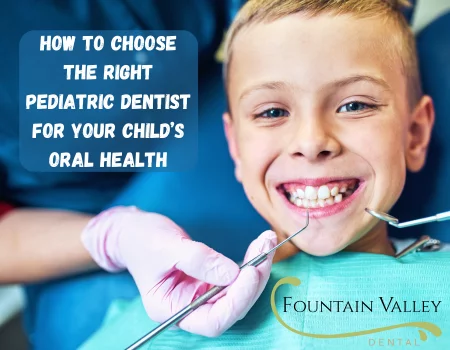When it comes to your child’s oral health, choosing the right pediatric dentist is crucial for ensuring they receive the best care in a comfortable and supportive environment. A pediatric dentist specializes in the care of children’s teeth, from infancy through adolescence, and has the expertise to manage the unique dental needs of young patients. The process of selecting the right pediatric dentist can seem overwhelming, but with the right information, you can make an informed decision that will benefit your child’s dental health for years to come.
 1. Start with Recommendations
1. Start with Recommendations
One of the best ways to find a pediatric dentist is by asking for recommendations from people you trust. Parents, family members, friends, or even your child’s pediatrician can provide valuable insights based on their own experiences. Often, word-of-mouth referrals can point you to dentists who are known for their gentle approach, expertise, and excellent patient care.
Additionally, you can research local pediatric dentists online. Read reviews on various platforms, but be sure to consider a wide range of opinions to get a balanced perspective. Many pediatric dentists have social media pages, websites, or Google business profiles where you can gather information about their services and customer feedback.
2. Verify Credentials and Qualifications
Once you’ve narrowed down your list, the next step is to verify the dentist’s credentials and qualifications. Pediatric dentists, also known as pedodontists, must complete a dental school program, followed by an additional 2–3 years of specialized training in child dentistry. This training equips them with the skills necessary to handle the oral health issues specific to children, such as teething, cavities, and preventive care.
Check if the dentist is certified by the American Academy of Pediatric Dentistry (AAPD) or any other relevant dental association. Membership in these organizations ensures that the dentist stays up-to-date with the latest advancements in pediatric dental care and adheres to high standards of practice.
3. Consider the Office Environment
The atmosphere of the dental office is particularly important when it comes to treating children. A pediatric dentist’s office should be welcoming, clean, and child-friendly. Look for an office that is designed with young patients in mind. Bright colors, fun decorations, toys, and kid-sized furniture can help create a relaxing environment that puts children at ease.
Pay attention to how the staff interacts with your child. A pediatric dentist’s office should be staffed with professionals who are trained to work with kids and can manage their anxieties and fears effectively. When you visit the office, observe the interactions between the staff and other children to see if they appear comfortable and engaged.
4. Evaluate the Dentist’s Approach to Treatment
Pediatric dentists are not only trained in treating children’s teeth but are also skilled in addressing their emotional and psychological needs. It’s important to find a dentist who takes the time to explain procedures in a way your child can understand, while also being gentle and patient during treatments.
During your initial consultation, ask the dentist about their approach to pediatric care. Do they offer strategies to ease dental anxiety? How do they approach behavior management? A good pediatric dentist will have a compassionate, patient demeanor and will prioritize making your child feel safe and comfortable.
Additionally, inquire about the dentist’s philosophy on preventive care. A proactive approach that emphasizes the importance of early intervention, healthy habits, and regular check-ups can prevent many dental issues before they become more serious problems. A dentist who takes the time to educate both you and your child on proper brushing, flossing, and nutrition habits is essential for long-term oral health.
5. Check Availability and Accessibility
A pediatric dentist who offers flexible hours, including evening or weekend appointments, can make it easier to get your child to the dentist without disrupting your daily routine. It’s also helpful to choose a dentist who is located conveniently near your home or workplace to minimize the stress of traveling for appointments.
In case of emergencies, find out if the dentist offers on-call services or if they are affiliated with a dental network that provides urgent care when needed. Being able to reach the dentist outside of regular office hours can provide peace of mind knowing that your child’s dental health will be in good hands.
6. Assess Communication and Comfort
The relationship between your child and the dentist is key to fostering a positive dental experience. During your first visit, observe how the dentist communicates with your child. Are they friendly, approachable, and patient? A dentist who is able to communicate clearly with both you and your child can help ease any fears and build trust.
Similarly, consider how well the dentist listens to your concerns. A good pediatric dentist will answer your questions thoughtfully and thoroughly, ensuring you feel confident in the care your child is receiving.
7. Trust Your Instincts
If something feels off or if you’re not comfortable with the dentist’s approach, don’t hesitate to explore other options. Your child’s comfort and trust in their dentist are vital to their overall experience, so it’s important to choose a dentist who aligns with your family’s values and needs.
Choosing the right pediatric dentist is an important decision that can significantly impact your child’s oral health and their attitude toward dental care. By considering factors such as recommendations, credentials, office environment, treatment approach, availability, and communication, you can find a pediatric dentist who will provide the best care for your child’s teeth and help them build a healthy, confident smile. Taking the time to make the right choice now will set your child on the path to a lifetime of good oral health.